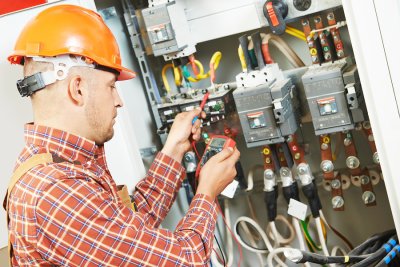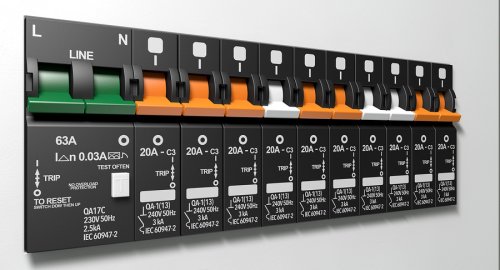-
When to Schedule an Electrical Safety Inspection
An electrical safety inspection can ensure that your wiring, electrical panel, and other electrical components are in proper working condition. To ensure that your safety inspection has been performed in a safe and accurate manner, it is best to trust this service to an electrician serving San Jose. Your electrician will have the tools and experience that are needed to make sure that your electrical system is up and running for all of your needs.
There are several times when it is important to schedule an electrical inspection for your property. Before and after you complete a home remodeling project, you will want to make sure to set up inspections with your electrical contractor. You may also choose to set up an electrical inspection when you are planning on hanging lights around your property. Electrical safety inspections are also very important for older homes. If you are considering the purchase of an older property, you will want to have your electrician come and take a look at your wiring and electrical panels.

-
Understanding Commercial Power Systems
When you are constructing a brand new commercial building for your business, you will need to hire an electrician that specializes in commercial electric installations. With services from a commercial electrician in San Jose , you can rest assured that your wiring, industrial lighting, and other electrical features have been safely and properly connected to the electrical grid. Before you embark on your commercial electrical system installation, it is a terrific idea to gather some basic information about how these units work. Here is an overview of what you need to know about commercial power systems.

Electricity Is Supplied By the Power Company
In order to provide electricity for your commercial building, your electrical contractor will start by connecting your building to the municipal power supply. The power company is responsible for transporting electricity from the power plant to your building. Typically, large commercial spaces receive around 13,800 volts of power to their grids. If you have a smaller building, your power company may need to adjust your voltage to a lower level.
Small Buildings Receive Simple Distribution Systems
The type of electrical distribution system that is installed in your building is dependent on the overall size and square footage of your facilities. If you are constructing a smaller commercial building, your electrician may recommend that your wiring, panels, and devices are connected directly to the transformer. In order to allow you to control your building’s power supply, your electrician will also install several circuit breakers. The circuit breakers will control the power flow to each branch of electrical components.
Large Buildings Require More Complex Systems
When an electrical system is created for a large and complex commercial building, it will be necessary to create an electrical system that is capable of handling a larger power load. Owners of large commercial buildings may also be responsible for purchasing and maintaining their own transformers. From the transformers, the electricity passes through a switchgear and then a circuit breakers. Your electrician can help you decide what type of commercial electrical system will be appropriate for your building.
-
Should You Upgrade to Recessed Lighting?
During your home remodeling or building project, you may want to talk to your electrician about creating a recessed lighting design. With recessed lighting, you can add light to a room, highlight artwork or other features, and also make your interior spaces look and feel bigger. In this video, you will receive some handy tips to keep in mind when you are choosing recessed lighting. An electrician serving San Jose can help you with every step of your installation.
As you are hanging lights and choosing locations for your recessed lighting, you will want to consult carefully with your electrical contractor. Your electrician will be able to help you choose the ideal location for all of the lights in your home, and he can also safely wire and install your new lights.
-
The Differences Between Circuit Breakers and Fuses
Circuit breakers are standard features in today’s homes. When you are considering purchasing a new house, you will want to determine whether your property is equipped with a circuit breaker box or a fuse box. Typically, only houses that were built before 1960 will contain fuse boxes. An electrician serving San Jose may recommend that you replace your home’s outdated fuse box with a brand new circuit breaker system.
One of the primary differences between circuit breaker boxes and fuse boxes is the operation of each type of unit. The fuses inside of a fuse box are designed to blow out during a power surge. After a fuse has blown, it will need to be replaced before power is restored to that area. By contrast, circuit breakers simply switch off when an electrical current causes a surge. Since circuit breakers do not blow, they offer greater convenience and safety to the homeowner.

RECENT POSTS
categories
- Uncategorized
- Delta Electric
- Commercial Electrical
- Residential Electrical
- Electric Circuits
- Dedicated Circuits
- Circuit Breakers
- Electrical Panels
- Electrical Wiring
- Safety Inspections
- copper wires
- Electrician San Jose
- Trained Electricians
- Electrical Services San Jose
- Malfunctioning Electrical Outlets
- Circuit Breaker
- Grounding
- safety
- Flickering Lights
- Arc Fault Breakers
- electrical system
- Aluminum Wiring
- Circuit Interrupters
- House Surge Protection
- Zinsco Panel Warnings
- Wiring Conversion
- GFCI outlet
- professional electrician
- Knob-and-Tube Wiring
- modern home electrical system
- Fuses
Archives
2024
2023
2018
2017
- December (4)
- November (4)
- October (5)
- September (4)
- August (4)
- July (4)
- June (4)
- May (4)
- April (4)
- March (3)
- February (4)
- January (3)
2016
- December (3)
- November (4)
- October (4)
- September (4)
- August (4)
- July (4)
- June (4)
- May (4)
- April (4)
- March (4)
- February (4)
- January (4)
2015
- December (4)
- November (4)
- October (4)
- September (4)
- August (3)
- July (4)
- June (4)
- May (3)
- April (4)
- March (4)
- February (2)
2014
- December (3)
- November (4)
- October (4)
- September (6)
- August (2)
- July (3)
- May (2)
- April (1)
- March (2)
- February (1)
- January (1)

